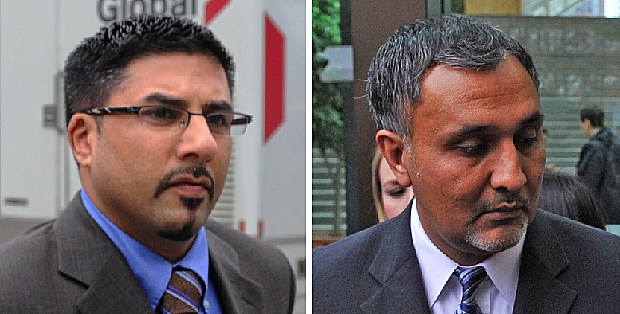B.C.’s auditor general has found no evidence of political interference in the decision to pay $6.4 million in legal fees for two former government aides convicted in the B.C. Rail case.
Russ Jones said public servants agreed to cover the legal costs of Dave Basi and Bob Virk in order to avoid the expense of a lengthy court case.
The former ministerial assistants subsequently pleaded guilty to breach of trust and accepting bribes, ending their high-profile trial shortly after it began.
Taxpayers ended up paying a total of $18 million to cover the cost of the defence and the prosecution in the abbreviated case.
Jones said the decision to pay the legal fees was kept separate from legal proceedings and was done for purely economic reasons.
“It was to save money,” he said.
The audit concluded that public servants acted legally and free from political interference when they granted the “special indemnities” to cover Basi’s and Virk’s legal costs.
“Senior public servants deliberately did not consult with ministers or the premier prior to making these indemnity decisions because they did not want to risk compromising the administration with political influence,” Jones said.
“Overall, we found that government’s indemnities practice wasn’t perfect, but it was principled.”
The audit shows that defence lawyers approached the government’s legal services branch in October 2010 to say they were considering a plea deal from the prosecution.
Before taking the deal to their clients, the defence lawyers wanted Basi and Virk freed from having to pay their legal bills if convicted.
By that point, the government had already spent $6 million on the pair’s defence, and the trial had only heard from two of a possible 42 witnesses, Jones said.
The defence was expected to cost another $2 million if the case ran its full course.
Meanwhile, Basi’s and Virk’s assets of $400,000 fell short of covering their defence costs no matter how long the trial lasted.
In the end, the branch recommended that the government pick up Basi’s and Virk’s legal bills as long as the two men pleaded guilty and were convicted.
The case accounted for more than half of the $11 million in special indemnities granted to more than 100 people from 1996 to 2011.
Jones’s office examined 26 of those agreements and found no evidence of political interference in any of them. Solicitor-client privileges prevented auditors from examining the other files.
The report makes 10 recommendations for improving reporting and accountability of special indemnities.
It recommends that the government obtain a waiver of solicitor-client privilege before agreeing to pay an individual’s legal fees, and calls for annual reporting of indemnities, standard rates for private legal counsel and a clear policy outlining people’s roles and responsibilities.
The report also suggests that the government hire an independent lawyer or member of the Legal Services Society to manage special indemnities in criminal matters.



